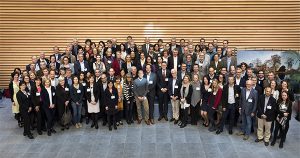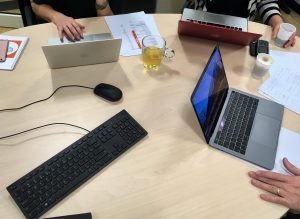On the 22nd of January we attended a workshop on the Preparation of Final Technical and Financial Reports of the ERNs, organised by the CHAFEA Health and Food Safety Unit Team.
General
Naples third Italian Meeting of Endo-ERN
On the 19th of January the Istituto Superiore di Sanità in Napels, Italy organised the third Endo-ERN meeting of the Italian HCPS. Both Endo-ERN coordinator Alberto Pereira and deputy coordinator Olaf Hiort attended.
First patient enrolled CPMS
Endo-ERN has enrolled its first patient into the Clinical Patient Management System (CPMS).
Specific Grant Application Year 2 submitted
Yesterday Endo-ERN submitted the Specific Grant Application (SGA), containing the work plan of Year 2 for Endo-ERN.
Endo-ERN is now on Facebook!
You can Like the Facebook page here to stay updated on news regarding ERNs, Endo-ERN, Paediatric and Adult Endocrinology, meetings and workshops, and much more.
Newsletter December 2017
Read the Endo-ERN Newsletter December 2017 now for an update on the CPMS & the scheduled educational webinars, a short report on the Steering Committee meeting in December, upcoming events, and much more.
Steering Committee & Advisory Board meeting 14 December
On the 14th of December, 2017, Endo-ERN held its 4th Steering Committee & Advisory Board meeting, this time via the video conferencing tool WebEx. The meeting was attended by the Endo-ERN coordinating office, most MTG and WP Chairs, most ePAGs and several Advisory Board members.
CPMS Webinar Schedule January 2018
The CPMS webinar schedule for January 2018 with links to register to participate (only registered participants will receive the link to join the webinar). We encourage all Endo-ERN members to participate.
Newsletter November 2017
Read the Endo-ERN Newsletter November 2017 now to find out more about the Clinical Patient Management System, the future of health, and the ERN Coordinators & Hospital Managers information day this month.
ERN Information day Rotterdam
On November 17th, 2017, Erasmus MC, Rotterdam hosted an ERN info day on ‘the role of hospital managers in shaping the future of ERNs’. Alberto Pereira (Endo-ERN Coordinator), Willy Spaan (LUMC CEO), and Enrique Terol (DG SANTE) were present.









